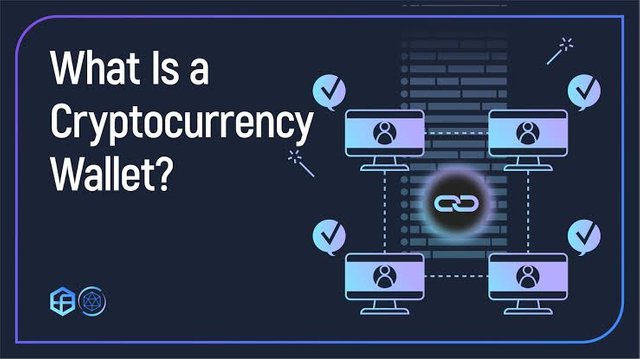Homework-Task 2 || Cryptocurrency Exchanges and Cryptocurrency Market Capitalization by @gbenga
Hello guys,
I bring to you all a seasonal greetings, hope you are all doing great. I welcome you all to my homework task provided by steemit professor @gbenga. Thanks to @steemitblog for this awesome initiative. These has really opened my eyes to many things I have not known about before.
Crypto Wallet
Many definition has been given on they said subject matter, people have in one way or the other aired out their opinion on what they feel is called a wallet. Today we all will be looking at another view of what crypto wallet is all about.
Defination: A cryptocurrency wallet is a piece of software that keeps track of the secret keys used to digitally sign cryptocurrency transactions for distributed ledgers.
Because those keys are the only way to prove ownership of digital assets – and to execute transactions that transfer them or change them in some way – they are a critical piece of the cryptocurrency ecosystem. Better known as "crypto wallets," they are like the keys to the blockchain car. Without those keys, the car won't run. And without them, there would be no way to prove ownership of a digital asset - anything from a bitcoin to a token representing some kind of asset.
Wallet actually has different types and with my little research today I will be sharing a few I have learnt about.
Cold wallet
Hot wallet.
Hot wallets are those that work only online and the best ones are decentralised wallets such as Exodus.
Cold wallets are offline and the cryptocurrencies are stored on a kind of device very similar to a pendrive. They are only online when we connect the device to a computer.
MERIT:
Easy to use; good for on-the-go transacting.
Convenient if you trade on your computer; safer than online or mobile wallets.
Not susceptible to hackers; you control your keys.
Very secure; cold storage; good for storing large amounts of cryptocurrency.
DEMERIT:
Least secure method of storing cryptocurrency.
Risk of downloading viruses.
If you don’t back up your computer and it dies, you lose your cryptos.
What is an exchange?
An exchange is a place where cryptocurrencies can be exchanged for each other, and cryptocurrencies for fiat currency. Nowadays, exchanges are much better known than wallets, as these often offer wallets with which they carry out their transactions, but there we will not have 100% control of our funds.
Exchanges are very useful and practical when our goal is to trade, (exchange) because we can make exchanges quickly and we have knowledge of our balance at all times.
Therefore, when we make the decision to invest in cryptocurrencies we will have to be clear about what we are going to do with them, in order to choose between a wallet and an exchange. In both we will be able to store our cryptocurrencies but they are really very different.
MERITS:
Decent exchange rates.
Low transaction fees.
Minimal deposit fees.
Dozens of Crypto’s available for exchange.
DEMERIT:
Sometimes slow customer service.
Some exchanges need KYC.
Limited payment options.
Q. Will You Keep Your Crypto Assets in a Wallet or on an Exchange?
Now, these is a personal question and can only be answered by you as a person, for me I will prefer to keep my crypto assets in the crypto wallet. As i already using this for the storing of my crypto assets. I think it is more safe than the exchanges.
I think An exchange is essentially a bank, with the added feature of real-time exchange. But there’s a difference: if the bank gets hacked, your personal data get stolen, but your funds are protected by insurance and transactions can be reversed. If an exchange gets hacked you not only give away your personal data, but you lose also all your Bitcoins, and Bitcoin transactions can’t be reversed.
Q. Reasons Why I would Prefer To Keep My Asset in Wallet?
Storing tokens on trade wallets can be perilous for various reasons.
- Hacking Risk
Notwithstanding the absence of guideline and powerlessness to ensure the security of resources, there is likewise the danger of a trade getting hacked. Trade hacks are generally normal, and because of the absence of guideline, when the coins get lost, that is it. The proprietors of the coins can't get them back from the trade. While blockchain itself is secure and basically unhackable, the unified idea of a trade makes them helpless.
- Lack of Ownership
While you can store any coins or tokens you buy on your trade wallet, you don't actually possess that wallet. Trade wallets are not quite the same as close to home wallets in that trade wallets are preferably "hot wallets" for exchanging. In the event that something occurs on the trade, at that point you don't have any command over your coins since they aren't in your guardianship, they have a place with the trade.
- Unregulated
Digital money trades are the combination of decentralization and centralization. The entire reason behind blockchain and cryptographic money is to advance decentralization. Be that as it may, trades are indeed unified, which makes various issues. Right now, the cryptographic money world is somewhat similar to the wild west, nobody is in control and there aren't numerous guidelines.
Conclusion
I hope I have covered the expectations of @gbenga's second class assignment. And I look forward for your corrections and advice where necessary.
.jpeg)

@simonnwigwe, I commend your ability to create great content. You have made very good points such as hacking risk but I would like to ask, "Which do you think get hacked the most often, personal wallet or exchange wallet"?
Hi @gbenga From they little research I have made I think exchange wallet gets hacked more easily.